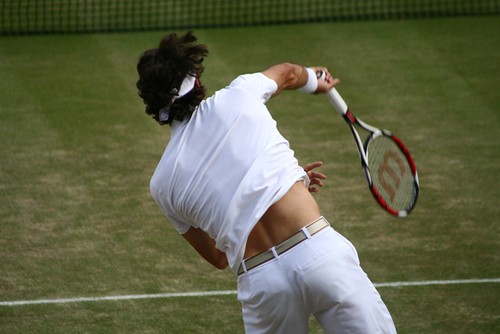Watching Wimbledon, I was thinking about how much the appeal of tennis depends on the scoring system. You have to win games by a two-point margin and sets by a two-game margin, so at the key moments in the match, when it’s tightest, the drama is artificially enhanced: the balance can swing back and forth between the players. But on the other hand, a 40-0 game is worth exactly as much one that goes to deuce and a 6-0 set is worth the same as one that goes to a tie-break. And that means that there is always the chance for the losing player to pull back.
As a thought experiment: the minimum number of point you have to win in a five set match is, if I’ve got my maths right, 72. So what would tennis be like if you scrapped the games and sets, and the winner was the first to 120 points? I assume it would be much less entertaining, as one player would tend to gradually pull out ahead and the match would just peter out.
But what would happen if you altered other sports? Some have made the experiment for us. There are various forms of cricket that use basically the same rules but take different amounts of time to play; the extremes are test cricket (five days) and 20-over cricket (about four hours). The five day game is gradual, attritional; it rewards virtues like concentration, will-power and consistency. The short version is explosive and fast-scoring; it rewards power, flair and risk-taking.* Both versions can produce great drama, but they are quite different to watch.
It gives me the urge to tweak other sports. For example, I don’t know much about ice hockey, but when I have watched it, as a soccer fan, it seems like the ice is just too crowded; there’s not enough time and space for anything to happen. So how would the game change if the rink was four times the size? Hell, let’s do the same with basketball — a much bigger court, perhaps a couple more players on each team.
I’m not suggesting that these innovations would definitely make for a better sport: it’s just a curious thought experiment. Maybe there’s a something waiting to be invented, some simple change to an existing sport that would magically make it much much better: American football with smaller teams, ping-pong with bigger tables, soccer without goalkeepers, indoor polo. Perhaps (probably) these ideas are stupid, but who knows?
If any of these ideas are, unexpectedly, brilliant — well, we’ll never know. There’s the weight of tradition that makes sports fans scream bloody murder at the idea of tinkering with their favourite sport; but also it would often take years to find out if a radical rule-change was, on balance, better or worse. It’s not enough to take existing players, ask them to play to new rules, and see what happens: you need time to see how it develops, for thoughtful people to come up with ideas and try them, for a new style of play to develop. Time for the law of unintended consequences to kick in, but also for people to adapt to to it.
But it’s fun to consider the possibilities, so any suggestions about how to improve your own favourite (or least favourite) sport should be posted in the comments.
* I won’t try to explain why this is true, since I know most of my readers come from non-cricketing nations, and those who know about cricket will understand already. And for those who do know about cricket: yes, this is probably an over-simplification, but hey-ho, it’ll do.
» The photo is Men’s Wimbledon Final 2008- Federer Vs Nadal, posted to Flickr by and © channy937.

